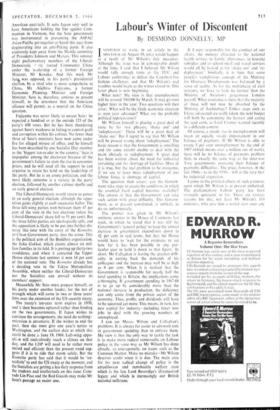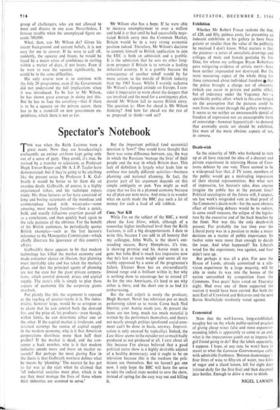Labour's Winter of Discontent
By DESMOND DONNELLY, MP IVENTURED to warn, in an article in the SPECTATOR on August 19, what would happen as a result of Mr Wilson's July measures. Although the issue was in considerable doubt at the time, I said that I believed Mr Wilson would rally enough votes at the TUC and Labour conference to defeat the Cousins-Clive Jenkins challenge; and that Mr Wilson's real troubles would begin as the winter closed in. This latter phase is now beginning.
What next? My view is that unemployment will be around 700.000 by March. It may go even higher later in the year. Two questions will then arise: What will be the likely economic situation as next year advances? What are the probable political repercussions?
Mr Wilson himself is placing a great deal of store by his two phrases, 'shake out' and 'redeployment.' There will be a great deal of 'shake out.' But I regret to say that Mr Wilson will be proved wrong about 'redeployment.' The basic reason is that the Government is unwilling and (to sonic extent) unable to deal with the main obstacle to redeployment. A great deal has been written about the need for industrial retraining and the shortage of facilities. Most of it is true, but the real problem to be overcome, if we are to have mass redeployment of our labour force, is shortage of capital.
The question then arises: can the Govern- ment take steps to create the conditions in which the essential fresh capital becomes available? The answer is that the Government can take such action with great difficulty. This Govern- ment, as at present constituted, is unlikely to do so, unfortunately.
The pointer was given in Mr Wilson's ominous answer in the House of Commons last week, in which he stated that it was still the Government's 'general policy' to keep the annual increase in government expenditure down to 41- per cent in real terms, but that the House would have to 'wait for the estimates to see how far it has been possible in any par- ticular year to hold it down to that figure.' In short, Mr Callaghan is having the greatest diffi- culty in cutting back the demands of his colleagues and the increase may well be as high as 6 per cent. When it is realised that the Government is responsible for nearly half the total spending in Britain, the implications come a-thronging. If government spending in 1967-68 is to go up by considerably more than the national increase in production, the deficiency can only come from the private sector of the economy. Thus, profits and dividends will have to be squeezed yet more. This means, in turn, less new capital for industry—including fewer new jobs to deal with the growing numbers of unemployed.
I can see Messrs Wilson and Callaghan's problems. It is always far easier to advocate cuts in government spending than to enforce them. My view is that the only way to tackle the task is to make more radical somersaults on Labour policy in the same way as Mr Wilson has done already, so courageously, on issues such as the Common Market. Make no mistake—Mr Wilson deserves credit when it is due. The main area for his next radical change of policy is the antediluvian and ramshackle welfare state which is the late Lord Beveridge's ill-conceived legacy and which is increasingly our British national millstone. If I were responsible for the conduct of our affairs, the moneys allocated to the national health service, to family allowances, to housing subsidies and to school meal and travel services would all be looked at for 'shake out' and 're- deployment.' Similarly, it is time that some people's vainglorious concept of the Ministry for Overseas Development was balanced by a sense of reality. As for the multiplicity of civil servants, we have to look no further than the Ministry of Aviation's gargantuan London payroll. What assurance is there that the majority of these will not now be absorbed by the Ministry of Technology? Unless steps such as I have advocated are really taken, the next budget w ill both be consuming the harvest and eating the seed corn, as Lord Cromer warned recently in a different context.
Of course, a steady rise in unemployment will mean an equally steady improvement in our balance of payments. If Mr Wilson is able to create 5 per cent unemployment by the end of 1967 (which means over a million out of work), there will be no balance of payments problem then, in exactly the same way as the inter-war Tory governments overcame their balance of payments difficulties. The price, however, in the late 1960s—as in the 1930s-- will at the very best be industrial stagnation.
I come to the political effects of such a course, upon which Mr Wilson is at present embarked. The parliamentary 1.abour party has been strangely quiescent so far. There are various reasons for this, not least Mr Wilson's 114 ministers, who give him a useful start over any
group of challengers, who are not allowed to meet and discuss in any case. Nevertheless, I foresee trouble when the unemployed figure ex- ceeds 700,000.
What, then, can Mr Wilson do? Given his recent background and current beliefs, it is not easy for me to answer. If he were to call off, suddenly, the squeeze and freeze, he would be faced by a major crisis of confidence in sterling within a matter of days, if not hours. Even if he were to ease the squeeze significantly, he could be in the same difficulties.
His only course now is to continue with the July 20 programme, even if the Government did not understand the full implications when it was introduced. To be fair to Mr Wilson, he has shown great courage in doing just this. But he has to face the corollary—that if there is to be a squeeze on the private sector, there has to be a standstill on new government ex- penditure, which there is not so far.
Mr Wilson also has a hope. If he were able to increase unemployment to over a million and hold it at that until he had successfully nego- tiated British entry into the Common Market, Britain would be in a very strong economic position indeed. Therefore, Mr Wilson's decision to commit himself to British application to join the EEC is both an admission and a gamble. It is the admission that he sees no other long- term prospect if Britain is to remain a leading industrial country. It is a gamble because the consequence of another rebuff would be far more serious to the morale of British industry than the 1963 fiasco. Whilst I warmly welcome Mr Wilson's changed attitude on Europe, I con- sider it imperative to warn about the dangers that are involved and the need for a contingency plan, should Mr Wilson fail to secure British entry. The question is: How far ahead is Mr Wilson thinking? And how far ahead are the rest of us prepared to think—and act?



































 Previous page
Previous page